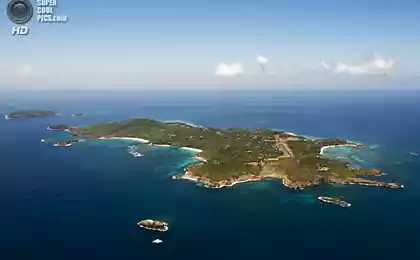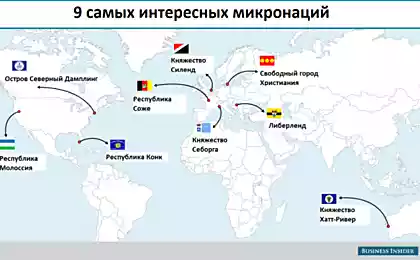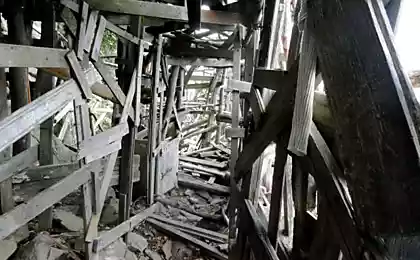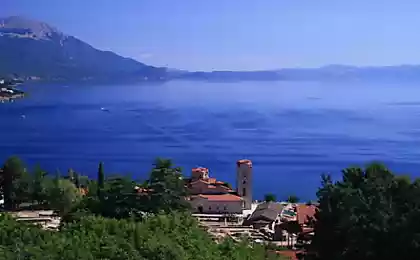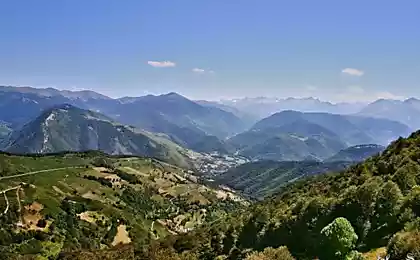681
The state, which is sinking
The structure of the Republic of Kiribati consists of 33 small atolls, twenty of which are uninhabited. Anote Tong, President of the Republic of Kiribati predicts that his country will become uninhabitable within the next 30-60 years because of rising sea levels and contamination of fresh water supplies.
25 photos via strajj
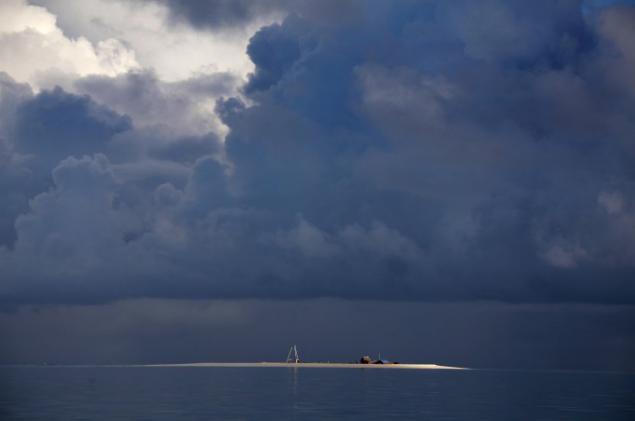
The first sign of this equatorial island state of Kiribati (pronounced Kir-and-bass), located in the central Pacific Ocean, is a tiny patch of greenery that violates the endless monotonous blue of the water. Tropical Storm clouds fill the sky, surging so high that it could not help feel defenseless and tiny. As the decline becomes apparent that small atolls reach just a few meters above sea level, even at its highest point. They constitute a small island state, and even from a height of shaving flight can be clearly seen that the land is valued its weight in gold, and all around - just endless plains of the ocean, which cuts only imagined the International Date Line.
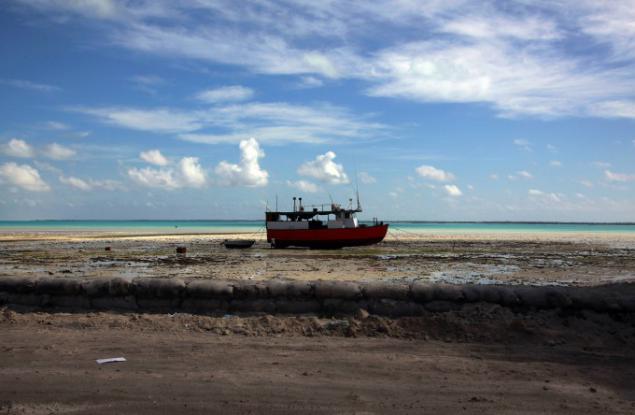
Passport control in a rather extravagant arrival hall consists of only two small columns made of palm leaves, with a sign "guests" and "residents". Rental car, which should be called the car "on borrowed time" waiting for me on the dusty parking lot exit. Key collection is reduced to the recognition of the fact that I was going to stay in the motel, which I called. Presentation of the document, not to mention the driver's license is not required at all - just a friendly smile and a handshake. I still wonder how to find a bed and breakfast, and I say, "Oh, just go straight for our only way - and popadёsh where necessary."
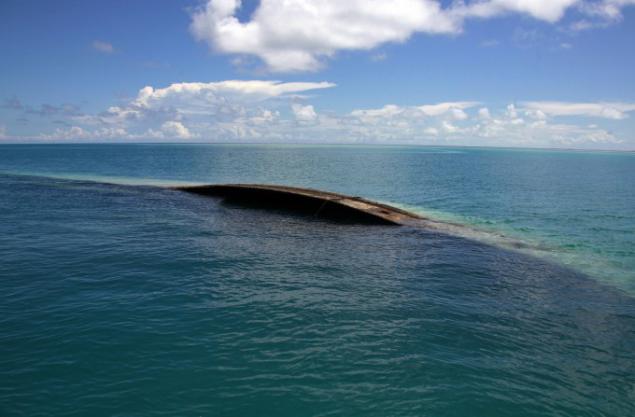
04
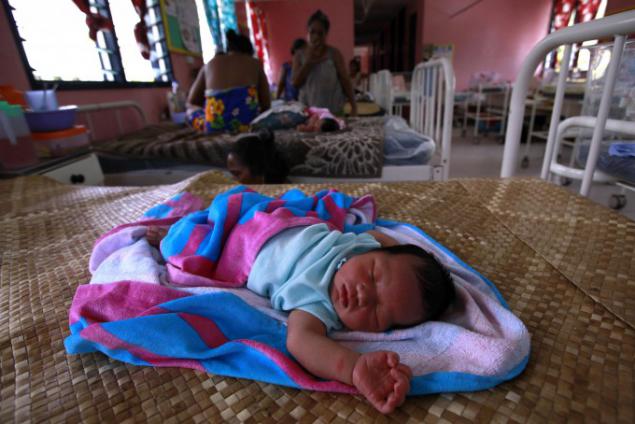
05
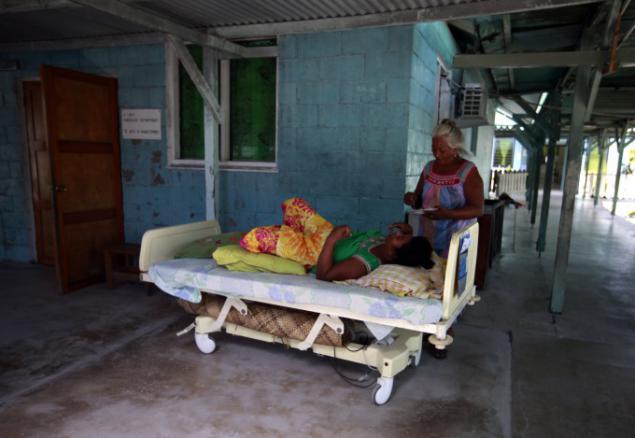
Upon arriving at the motel I meet David Lambourne (David Lambourne), well-informed local resident who moved to the capital of Kiribati Tarawa (Tarawa) from Australia about 18 years ago to discuss the challenges facing the country. These problems are generally reduced to various catastrophic scenarios, for one day can become Kiribati uninhabited island under pressure from demographic and socio-economic difficulties, on the one hand, and steadily advancing sea, on the other. David claims that it is a real prospect, especially for a small group of atolls that make up South Tarawa.
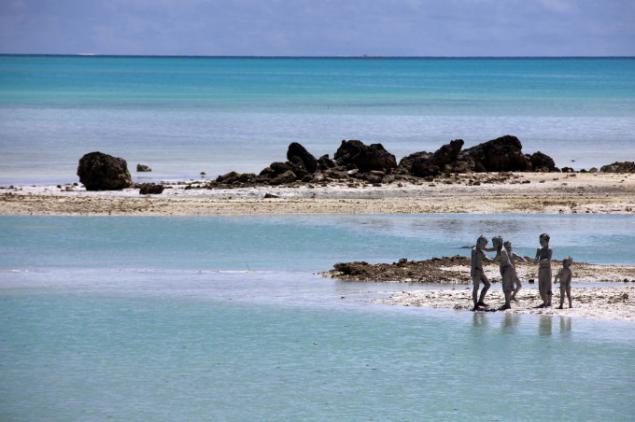
07
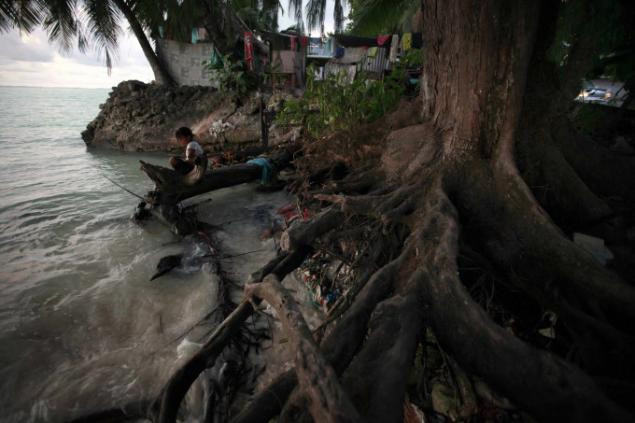
Tarawa is divided into two parts - north and south. David carries me to the village of Betio (Betio), located in the south and are already suffering from population density that exceeds London: currently it is about 5,200 people per square kilometer. Amazingly, the population growth forecast for this area indicates that this figure could double in less than a decade. Squalid huts Betio collected mainly from pieces of corrugated iron and somehow knocked together wooden panels. They give the impression of shelters for temporary accommodation. But, according to David, these homes decades, and the chances that in the future it will change is extremely small.
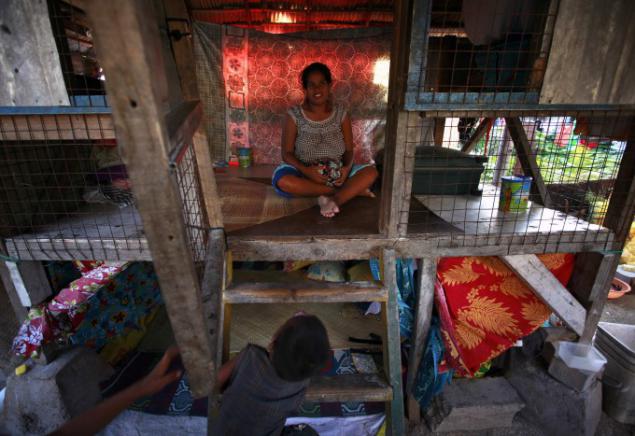
09
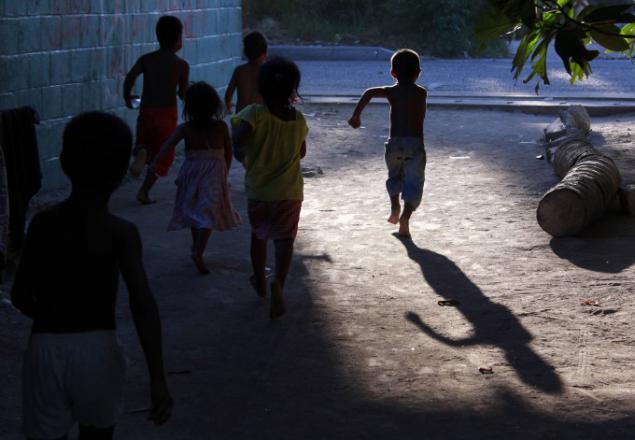
10
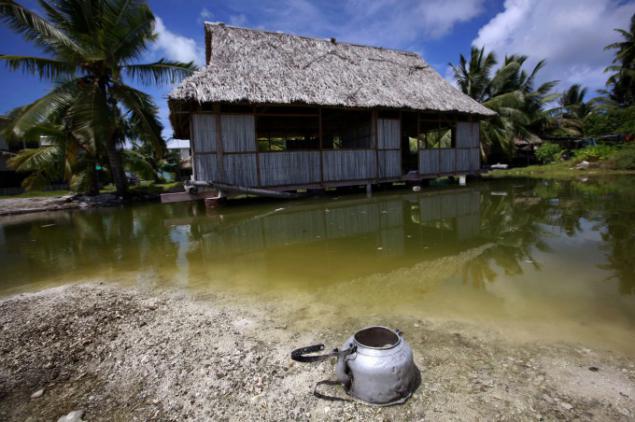
But homeowners are most concerned about is not even that. The lack of sewage leads to exorbitant pollution. There has been an outbreak of cholera in the late 70's, and many residents are worried that the current level of sanitation, it could easily happen again. Local stocks are replenished with fresh water from small "lenses", located just below the soil surface, and hundreds more wells are scattered between dilapidated huts. The water in these wells constantly polluted by various waste and becoming saltier due to rising sea levels. Accordingly, any type of cultivation of food crops is extremely difficult.
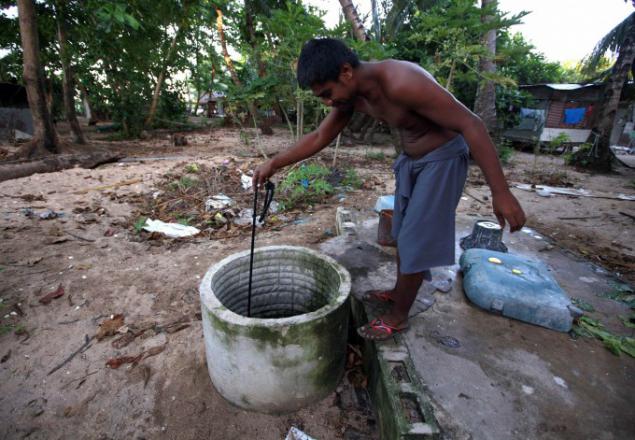
12
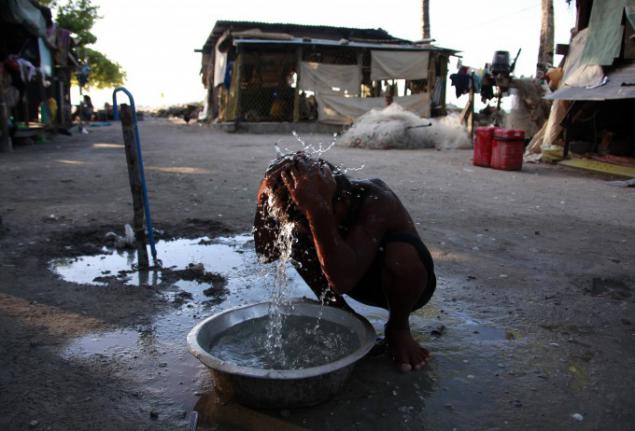
13
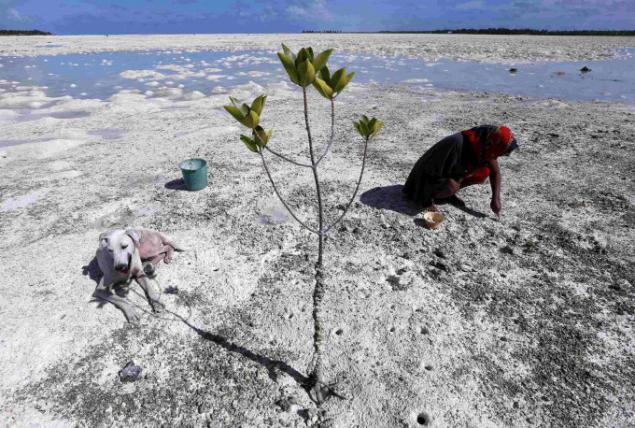
After a visit to Betio I move on and soon come across another expressive scene. Local women - some of which are looming somewhere far away on the horizon - wander through the shallow water lagoons and, bent double, dig something out of the stinking muck reef. I dare to move away from the car for a few meters, almost immediately falling into the mud, but in the end, get to a woman and her dog pretty nervous. The woman lifts her head for a moment, noting the appearance of my fleeting smile, then returned to his grueling work. It is obvious that her work requires superhuman effort. And it's not just the searing heat of, the strong reflecting surface of the reef. Women digging in the mud kitchen forks and knives in search of clams, which lie just below the surface. It is impossible to resist the feeling of respect and admiration towards this group of determined women who so selflessly working hour after hour, only occasionally stopping to look at this lunatic with a camera and gave him a friendly smile.
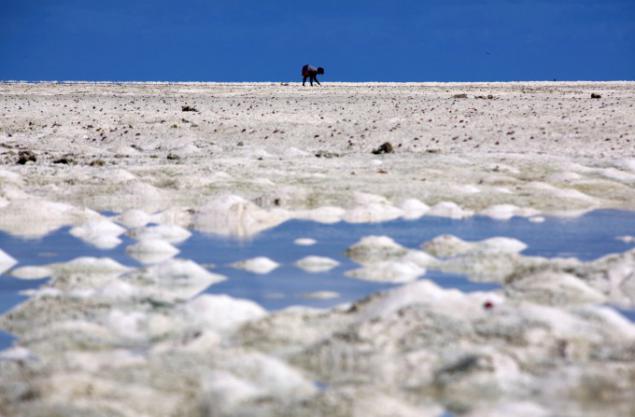
15
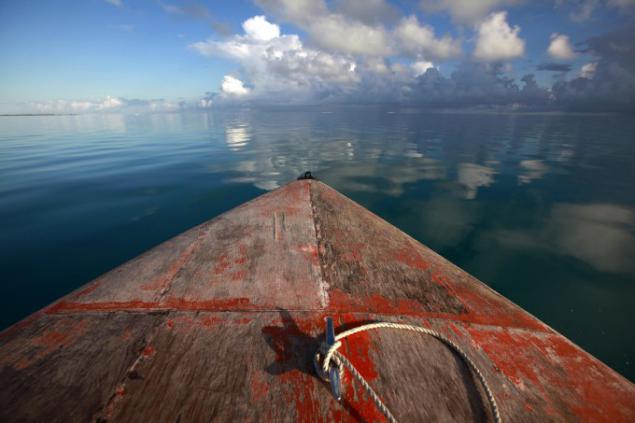
16
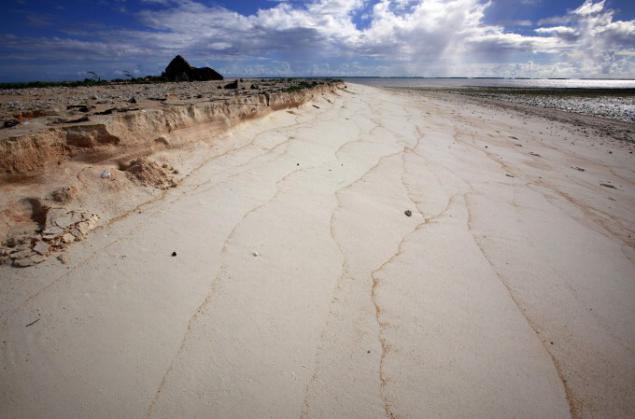
17
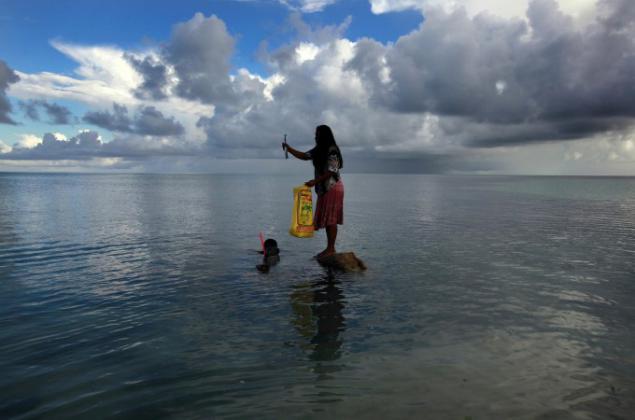
18
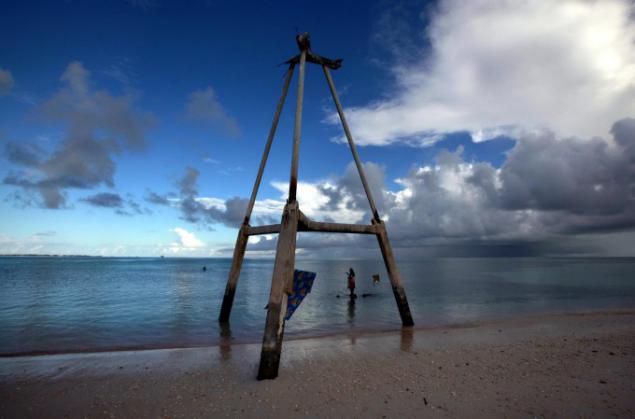
19
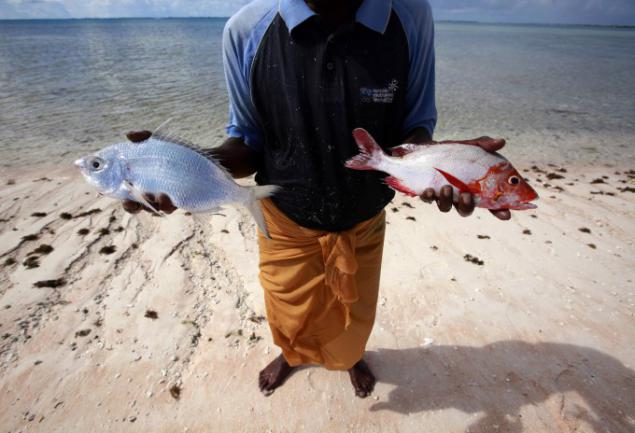
20
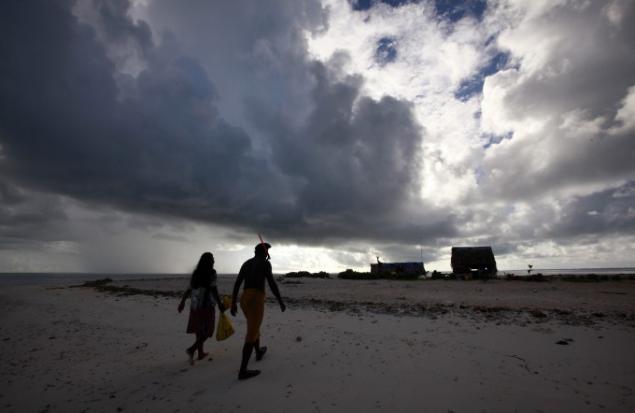
Going forward, I am convinced firsthand how the poorest countries of Kiribati: very often - a countless dilapidated huts standing along the road, littered with potholes and pits.
Later I took a boat to visit a small island called Baykmen (Bikeman), which is just a 20-minute drive west of the overcrowded South Tarawa. There lives a family, decided to build a house and move to the scrap sand that rises almost 10 centimeters (four inches) above the level of the tide. The reason is simple, explains Binat Pinata (Binata Pinata) and her husband Kaibakia (Kaibakia): "It is better to sleep and better lives - not so crowded and full of fresh healthy fish. The only problem, however, is that we need every day boating in Tarawa for fresh water. " Yeah - this problem with the water supply here can not escape.
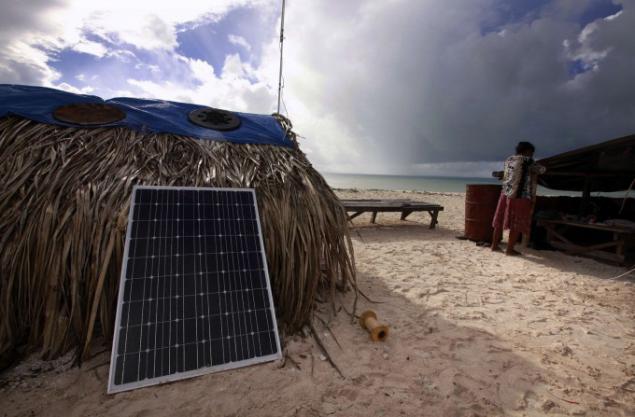
22
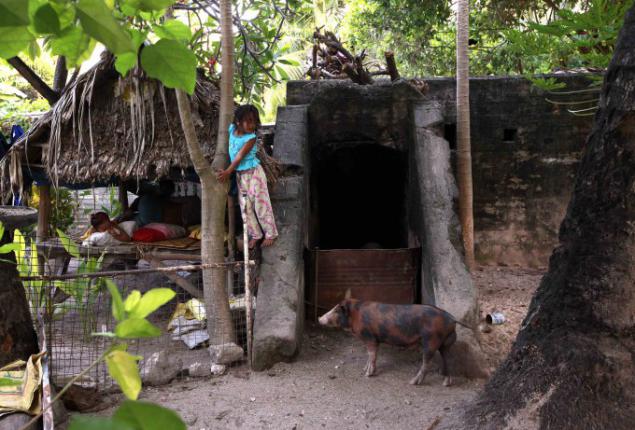
In South Tarawa everywhere there are traces of the last world war, have become as much a part of the landscape, like coconut palms and sea walls. Japanese bunker and big guns still standing evidence of the battle that broke out here in 1943 and claimed the lives of more than 1,600 US Marines and countless Japanese soldiers. This once again underlines the value of a plot of land in the area, surrounded by a giant ocean. And yet it reminds that external factors have long been exposed to the environment of Kiribati and that the indigenous people of this country - those who are least to blame for the existing problems - have to reap the fruits of these factors.
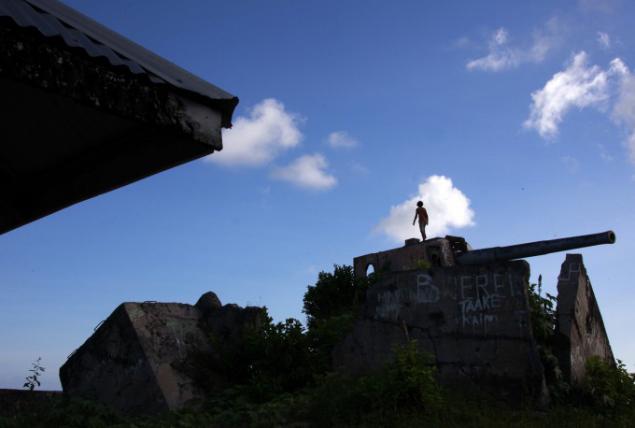
Once, in a conversation with me one local resident remarked with a wry smile that Kiribati is sometimes called "the next Atlantis." But from what I saw, the conclusion: long before the tiny nation would be flooded by the annual all-consuming "royal" tides, it can easily pull the ballast into the abyss of their own demographic and socio-economic problems.
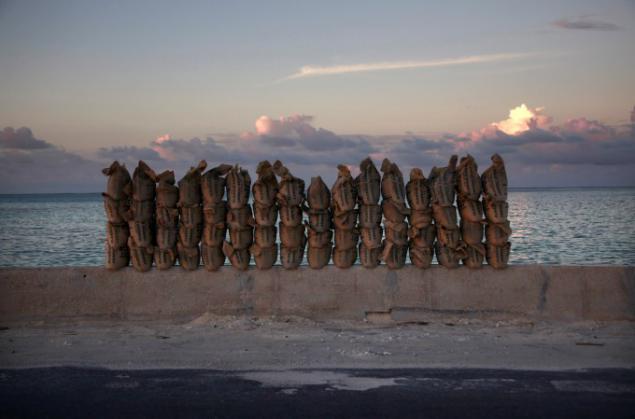
25
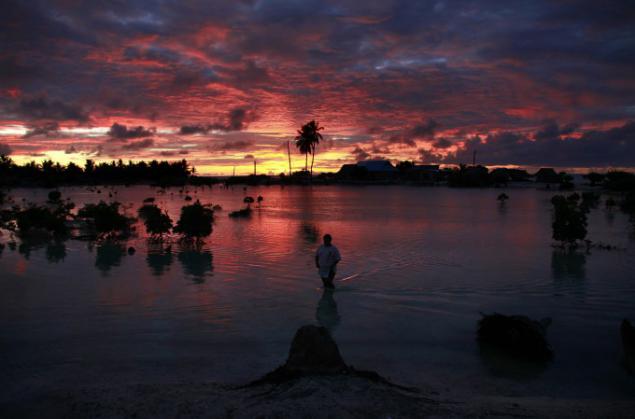
Source:
25 photos via strajj

The first sign of this equatorial island state of Kiribati (pronounced Kir-and-bass), located in the central Pacific Ocean, is a tiny patch of greenery that violates the endless monotonous blue of the water. Tropical Storm clouds fill the sky, surging so high that it could not help feel defenseless and tiny. As the decline becomes apparent that small atolls reach just a few meters above sea level, even at its highest point. They constitute a small island state, and even from a height of shaving flight can be clearly seen that the land is valued its weight in gold, and all around - just endless plains of the ocean, which cuts only imagined the International Date Line.

Passport control in a rather extravagant arrival hall consists of only two small columns made of palm leaves, with a sign "guests" and "residents". Rental car, which should be called the car "on borrowed time" waiting for me on the dusty parking lot exit. Key collection is reduced to the recognition of the fact that I was going to stay in the motel, which I called. Presentation of the document, not to mention the driver's license is not required at all - just a friendly smile and a handshake. I still wonder how to find a bed and breakfast, and I say, "Oh, just go straight for our only way - and popadёsh where necessary."

04

05

Upon arriving at the motel I meet David Lambourne (David Lambourne), well-informed local resident who moved to the capital of Kiribati Tarawa (Tarawa) from Australia about 18 years ago to discuss the challenges facing the country. These problems are generally reduced to various catastrophic scenarios, for one day can become Kiribati uninhabited island under pressure from demographic and socio-economic difficulties, on the one hand, and steadily advancing sea, on the other. David claims that it is a real prospect, especially for a small group of atolls that make up South Tarawa.

07

Tarawa is divided into two parts - north and south. David carries me to the village of Betio (Betio), located in the south and are already suffering from population density that exceeds London: currently it is about 5,200 people per square kilometer. Amazingly, the population growth forecast for this area indicates that this figure could double in less than a decade. Squalid huts Betio collected mainly from pieces of corrugated iron and somehow knocked together wooden panels. They give the impression of shelters for temporary accommodation. But, according to David, these homes decades, and the chances that in the future it will change is extremely small.

09

10

But homeowners are most concerned about is not even that. The lack of sewage leads to exorbitant pollution. There has been an outbreak of cholera in the late 70's, and many residents are worried that the current level of sanitation, it could easily happen again. Local stocks are replenished with fresh water from small "lenses", located just below the soil surface, and hundreds more wells are scattered between dilapidated huts. The water in these wells constantly polluted by various waste and becoming saltier due to rising sea levels. Accordingly, any type of cultivation of food crops is extremely difficult.

12

13

After a visit to Betio I move on and soon come across another expressive scene. Local women - some of which are looming somewhere far away on the horizon - wander through the shallow water lagoons and, bent double, dig something out of the stinking muck reef. I dare to move away from the car for a few meters, almost immediately falling into the mud, but in the end, get to a woman and her dog pretty nervous. The woman lifts her head for a moment, noting the appearance of my fleeting smile, then returned to his grueling work. It is obvious that her work requires superhuman effort. And it's not just the searing heat of, the strong reflecting surface of the reef. Women digging in the mud kitchen forks and knives in search of clams, which lie just below the surface. It is impossible to resist the feeling of respect and admiration towards this group of determined women who so selflessly working hour after hour, only occasionally stopping to look at this lunatic with a camera and gave him a friendly smile.

15

16

17

18

19

20

Going forward, I am convinced firsthand how the poorest countries of Kiribati: very often - a countless dilapidated huts standing along the road, littered with potholes and pits.
Later I took a boat to visit a small island called Baykmen (Bikeman), which is just a 20-minute drive west of the overcrowded South Tarawa. There lives a family, decided to build a house and move to the scrap sand that rises almost 10 centimeters (four inches) above the level of the tide. The reason is simple, explains Binat Pinata (Binata Pinata) and her husband Kaibakia (Kaibakia): "It is better to sleep and better lives - not so crowded and full of fresh healthy fish. The only problem, however, is that we need every day boating in Tarawa for fresh water. " Yeah - this problem with the water supply here can not escape.

22

In South Tarawa everywhere there are traces of the last world war, have become as much a part of the landscape, like coconut palms and sea walls. Japanese bunker and big guns still standing evidence of the battle that broke out here in 1943 and claimed the lives of more than 1,600 US Marines and countless Japanese soldiers. This once again underlines the value of a plot of land in the area, surrounded by a giant ocean. And yet it reminds that external factors have long been exposed to the environment of Kiribati and that the indigenous people of this country - those who are least to blame for the existing problems - have to reap the fruits of these factors.

Once, in a conversation with me one local resident remarked with a wry smile that Kiribati is sometimes called "the next Atlantis." But from what I saw, the conclusion: long before the tiny nation would be flooded by the annual all-consuming "royal" tides, it can easily pull the ballast into the abyss of their own demographic and socio-economic problems.

25

Source:




